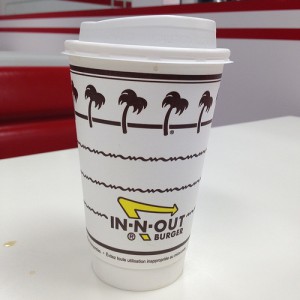Why the In-N-Out Spilled Coffee Lawsuit Isn’t Frivolous
In lawsuits involving coffee burn victims, the media’s armchair lawyering isn’t remotely helpful. Instead of seeing coffee burn victims as lawsuit happy bandits, news pundits should should take a moment to better understand how the law works in these cases.
 Anyone remember the 1992 McDonalds coffee case? As a quick refresher, that case involved a 79 year old Stella Liebeck, who spilled coffee around her thighs while attempting to put cream and sugar in it. Despite 700 previous complaints, McDonalds never reduced the temperature of their coffee before Ms. Liebeck brought her case. She stayed at the hospital for eight days and had to undergo skin grafts. Liebeck never sued anyone before, but her attorney convinced a court to award $640,000 in damages total. McDonalds, who had rejected previous settlement offers, made a secret settlement deal with Liebeck to avoid appeals.
Anyone remember the 1992 McDonalds coffee case? As a quick refresher, that case involved a 79 year old Stella Liebeck, who spilled coffee around her thighs while attempting to put cream and sugar in it. Despite 700 previous complaints, McDonalds never reduced the temperature of their coffee before Ms. Liebeck brought her case. She stayed at the hospital for eight days and had to undergo skin grafts. Liebeck never sued anyone before, but her attorney convinced a court to award $640,000 in damages total. McDonalds, who had rejected previous settlement offers, made a secret settlement deal with Liebeck to avoid appeals.
In 2014, it might be In-N-Out’s turn to go through a hot coffee case. On April 1st, 2013, Hedy Chen and a friend visited an Oakland In-N-Out. Chen’s suit alleges that the coffee was so hot that Chen dropped the coffee on her thighs and lap when the employee handed the paper cup to her. Chen, who was wearing shorts, screamed for 911.
Chen alleges that the drive-through attendant refused, citing company policy. Instead, the employee gave her a bag of ice and told her to move her car for the next customer. Chen’s friend called 911 instead. Chen’s attorney claims she received second degree burns. The burns left scars on her, which are still there today.
The Justice System Takes Personal Responsibility into Account
The media wants to blame the victims for the coffee spills. The logic is that if they spilled the coffee, it’s their fault. The plaintiffs, the parties bringing the suit, merely want to profit from a lawsuit happy culture. Nobody wants to take responsibility for their own actions and the legal system rewards that behavior.
That is a simplistic and flawed way of looking at the cases. Both New Mexico and California, where Liebeck and Chen were burned, follow a “pure comparative negligence” system when awarding damages to plaintiffs. In English, this means that the court assigns each party a percentage of the responsibility for the accident. The plaintiff in a personal injury case receives money based on his or her injuries, minus his or her percentage of the responsibility. For example, Liebeck was given $200,000 for her hospital stay, skin grafts, and her daughter’s lost wages due to missed work while nursing her mother. The jury found Liebeck 20% liable for her injuries, so the award was reduced to $160,000.
In the McDonalds case, Liebeck was considered 20% responsible for her injuries. The comparative negligence defense recognizes that people do stupid things. If a plaintiff is judged to be 100% responsible, the plaintiff won’t receive anything. Conversely, under the “all or nothing” approach that the media seems to prefer, a defendant who is 99% responsible for an accident wouldn’t have to pay a penny if the victim is 1% responsible for his or her injuries.
Even if Chen was 100% responsible for her own burns, I doubt In-N-Out would point the finger at her so quickly. Comparative negligence is an affirmative defense. This means that In-N-Out would admit some fault, but then say that Chen’s behavior was worse. In-N-Out will claim, and their vice president already claims, that there is no company policy which would have prevented Chen from seeking help.
If In-N-Out researched the McDonalds case, In-N-Out might claim that the company’s policies did not contribute to the burns. Their vice president says “In-N-Out Burger associates are authorized to assist our customers and to call 911 in emergency situations.” In-N-Out might claim they had a policy in place and therefore they did nothing wrong. This is very different from comparative negligence. The affirmative defense means finger pointing, but the company might still have to pay. If In-N-Out argues that the company did not breach their legal responsibilities though, they wouldn’t be liable for Chen’s burns at all.


Comments